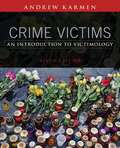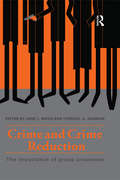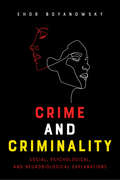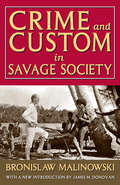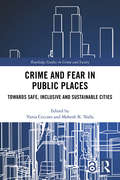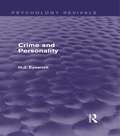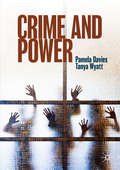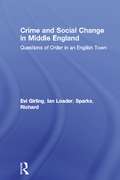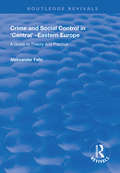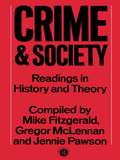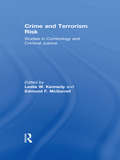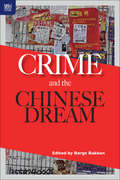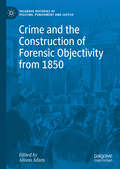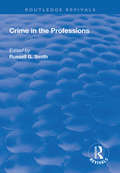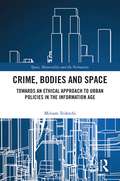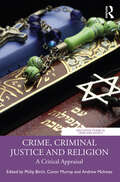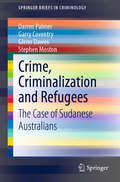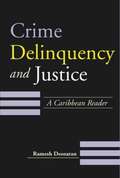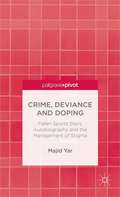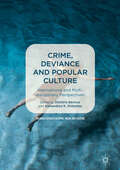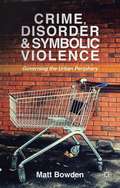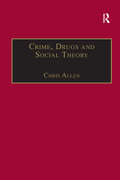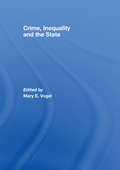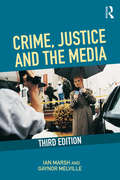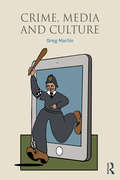- Table View
- List View
Crime Victims: An Introduction To Victimology (Ninth Edition)
by Andrew KarmenA first in the field when initially published and now a true classic, CRIME VICTIMS: AN INTRODUCTION TO VICTIMOLOGY, Ninth Edition offers the most comprehensive and balanced exploration of victimology available today. The author examines the victims' plight, carefully placing statistics from the FBI's Uniform Crime Report and Bureau of Justice Statistics National Crime Victimization Survey in context. At the same time, he "humanizes" victims' stories through compelling case studies. The text systematically investigates how victims are currently handled by the criminal justice system, analyzes the goals of the victims' rights movement, and discusses what the future is likely to hold. This Ninth Edition presents current coverage of the seriousness of intimate partner violence, child abuse, sexual assaults in the U. S. military, acquaintance rapes on college campuses, shootings on campuses, whether arming for self-protection is an effective strategy, and similar high-profile issues. It also includes new information about "survivorology" and "bystanderology" as well as new material on practical issues facing victims.
Crime and Crime Reduction: The importance of group processes
by Theresa A. Gannon Jane L. WoodThe problems associated with groups that commit crime are well known and notoriously complex. However, there are many questions that we still cannot answer with certainty. This book seeks to deepen understanding of the group processes involved in crime and the treatment of offenders’ thoughts and behaviour. Together, the chapters in this volume address the following questions: Are people more likely to commit crime because of the influence of their group? Does group membership cause people to become criminals, or does the group merely foster people’s pre-existing criminal inclinations? How does group membership exert such a strong hold on people so that some risk imprisonment or even death, rather than relinquish their membership? The contributors to Crime and Crime Reduction consider the social psychological influences of groups and specific forms of group crime such as street and prison gangs, terrorism, organized criminal networks, and group sexual offending. The book also addresses important questions about the role of groups in treating offenders, and why existing group membership should be considered when treating offenders. Group criminal activity is a key area of study for researchers and for students of Forensic Psychology and Criminology courses. This book will therefore be of interest to students, scholars, and law enforcement practitioners who want to understand the group processes involved in crime and its reduction.
Crime and Criminality: Social, Psychological, and Neurobiological Explanations
by Ehor BoyanowskyThis informative and entertaining book, peppered with personal anecdotes, and rich in case studies, adopts an eclectic approach to studying the causes of crime. Rather than rely on one theoretical position, Boyanowsky opts to borrow from a variety of theories to arrive at the most effective answer. As a result, even seasoned veterans will learn from this book. Crime and Criminality employs case studies, both notorious and lesser known, to bring theories to life, and to offer insight into vital contemporary topics like domestic violence, child pornography, genocide, the effect of climate change on crime, and the evolution of cybercrime. Entertaining, and accessible, and comparative in scope, this text is ideal for students and general readers interested in understanding the varied causes of crime. Instructor supports in the form of PowerPoint slides as well as introductions, and summaries for each chapter make this an ideal text for criminology courses.
Crime and Custom in Savage Society: [1926/1940] (Quality Paperback Ser. #No. 210)
by Russell Smith Bronislaw MalinowskiCrime and Custom in Savage Society represents Bronislaw Malinowski's major discussion of the relationship between law and society. Throughout his career he constructed a coherent science of anthropology, one modeled on the highest standards of practice and theory. Methodology steps forward as a core element of the refashioned anthropology, one that stipulates the manner in which anthropological data should be acquired.Malinowski's choice of law was not inevitable, but neither was it unmotivated. Anyone interested in understanding the social structure and organization of societies cannot avoid dealing with the concept of "law," even if it is to deny its presence. Law and anthropology have shown a natural affinity for one another, sharing a beneficial history of using the methods and viewpoints of one to inform and advance the other.The best lesson Malinowski provides us with comes in the last paragraphs of Crime and Custom in Savage Society: "The true problem is not to study how human life submits to rules; the real problem is how the rules become adapted to life." On that question, he has left us richly inspired to continue the quest.
Crime and Fear in Public Places: Towards Safe, Inclusive and Sustainable Cities (Routledge Studies in Crime and Society)
by Vania Ceccato Mahesh K. NallaThe Open Access version of this book, available at https://www.taylorfrancis.com/books/9780429352775 has been made available under a Creative Commons Attribution-Non Commercial-No Derivatives 4.0 license. No city environment reflects the meaning of urban life better than a public place. A public place, whatever its nature—a park, a mall, a train platform or a street corner—is where people pass by, meet each other and at times become a victim of crime. With this book, we submit that crime and safety in public places are not issues that can be easily dealt with within the boundaries of a single discipline. The book aims to illustrate the complexity of patterns of crime and fear in public places with examples of studies on these topics contextualized in different cities and countries around the world. This is achieved by tackling five cross-cutting themes: the nature of the city’s environment as a backdrop for crime and fear; the dynamics of individuals’ daily routines and their transit safety; the safety perceptions experienced by those who are most in fear in public places; the metrics of crime and fear; and, finally, examples of current practices in promoting safety. All these original chapters contribute to our quest for safer, more inclusive, resilient, equitable and sustainable cities and human settlements aligned to the Global 2030 Agenda for Sustainable Development.
Crime and Personality (Psychology Revivals)
by H.J. EysenckWhen Crime and Personality was first published in 1964, J.A.C. Brown, writing in the New Statesman, commented: ‘There can be no doubt of the importance of Professor Eysenck’s book on the nature and treatment of criminal behaviour.’ This third edition, originally published in 1977, had been completely revised and brought up to date, and although the major theory linking personality and crime has been retained, many of the details have been changed in conformity with recent research of the time. The book presents a theory concerning the personality of criminals, and offers evidence to show that these personality features characterising criminals are based on genetic foundations. It is argued that criminality as a whole is not exclusively based on environmental factors as has so often been suggested, but has a strong biological basis. A good deal of evidence is reviewed showing that there are many data supporting this view, from studies of identical and fraternal twins, adopted children, and comparisons between criminals and non-criminals both in the Western world and in Communist countries. Professor Eysenck suggests that important consequences follow from such an attempt to redress the one-sided emphasis on environmental factors which had been so characteristic of the previous fifty years, and some of these consequences are described in detail. He further suggests that only proper understanding of the psychological factors making for antisocial behaviour will help in reversing the increasing burden that criminality places upon society. The book also takes issue with political arguments of the time regarding the origins of criminality, and shows that criminals behind the Iron Curtain show the same personality characteristics as do criminals in Western countries.
Crime and Power
by Pamela Davies Tanya WyattThis textbook makes a concerted effort to expose crimes committed by those wielding unfettered personal power and crimes by corporations, business and states, crimes against human and non-human species and the environment. It examines an increasingly complex interplay of issues which surely should be at the heart of any criminology programme. This text adopts a fresh and innovative approach to exposing the crimes of the powerful, situating and understanding crimes and victimisations as it does within a framework where questions of structural and personal power in society are key. Fourteen case studies are threaded throughout the book and this methodology is used as a teaching resource for studying and uncovering the crimes of the powerful. The first three chapters comprehensively contextualise the problems of crime and power and establish the importance of power to understanding crime and victimisation in society. The chapters within Part I and Part II of the book then explore individual and group power respectively. Each of these chapters explore a case study or case examples followed by ‘Pause for Thought’ questions. Bigger ‘Go Further’ study questions are posed at the close of these chapters challenging students to engage in their own case study research to investigate the dynamics of crime and power.
Crime and Social Change in Middle England: Questions of Order in an English Town
by Ian Loader Richard Sparks Evi GirlingCrime and Social Change in Middle England offers a new way of looking at contemporary debates on the fear of crime. Using observation, interviews and documentary analysis it traces the reactions of citizens of one very ordinary town to events, conflicts and controversies around such topical subjects of criminological investigation as youth, public order, drugs, policing and home security in their community. In doing so it moves in place from comfortable suburbs to hard pressed inner city estates, from the affluent to the impoverished, from old people watching the town where they grew up change around them to young in-comers who are part of that change. This is a book which will give all students of crime a rare and fascinating insight into how issues at the heart of contemporary law and order politics both nationally and internationally actually play out on the ground.
Crime and Social Control in Central-Eastern Europe: A Guide to Theory and Practice (Routledge Revivals)
by Aleksandar FaticFirst published in 1997. This work provides a criminological introduction to the current situation of criminal justice systems in the politically changing Central-Eastern Europe after 1989. It explores concrete problems which the countries are facing, such as the release of political prisoners and those sentenced excessively under the communist regime. The concluding part illuminates the case studies in the previous sections from the point of view of their possible interaction into a cohesive and coherent criminological discipline.
Crime and Society: Readings in History and Theory (Readings In History And Theory Ser.)
by Mike Fitzgerald Gregor McLennan Jennie PawsonFirst Published in 1980. Routledge is an imprint of Taylor & Francis, an informa company.
Crime and Terrorism Risk: Studies in Criminology and Criminal Justice
by Leslie W. Kennedy Edmund F. McGarrellCrime and Terrorism Risk is a collection of original essays and articles that presents a broad overview of the issues related to the assessment and management of risk in the new security age. These original articles show how researchers, experts and the public are beginning to think about crime and terrorism issues in terms of a new risk paradigm that emphasizes establishing a balance between threat and resources in developing prevention and response strategies.
Crime and the Chinese Dream
by Edited by Børge BakkenAlthough official propaganda emphasizes the Chinese Dream as the dream of all Chinese, the opportunities of achieving the prosperity by legal means are distributed unequally. Crime and the Chinese Dream reveals how people on the margins of Chinese society find their way to the Chinese Dream through illegal or deviant behaviours. The case studies in this book include corrupt doctors in public hospitals in Beijing, fraudsters in a village called ‘cake uncles’, illegal motorcycle taxi drivers in Guangzhou, drug users being ‘re-educated’ in detention centres, and internet addicts who are treated as criminals by the system. Despite the patriotic and collectivistic tint of the official dream metaphor, the contributors to this volume show that the Chinese Dream is essentially a state capitalist dream, which is embedded within the problems and opportunities of capitalism, as well as a dream of control.
Crime and the Construction of Forensic Objectivity from 1850: Space, Media, Experts And Ethics (Palgrave Histories of Policing, Punishment and Justice)
by Alison AdamThis book charts the historical development of 'forensic objectivity' through an analysis of the ways in which objective knowledge of crimes, crime scenes, crime materials and criminals is achieved. Taking an interdisciplinary approach, with authors drawn from law, history, sociology and science and technology studies, this work shows how forensic objectivity is constructed through detailed crime history case studies, mainly in relation to murder, set in Scotland, England, Germany, Sweden, USA and Ireland. Starting from the mid-nineteenth century and continuing to the present day, the book argues that a number of developments were crucial. These include: the beginning of crime photography, the use of diagrams and models specially constructed for the courtroom so jurors could be ‘virtual witnesses’, probabilistic models of certainty, the professionalization of medical and scientific expert witnesses and their networks, ways of measuring, recording and developing criminal records and the role of the media, particularly newspapers in reporting on crime, criminals and legal proceedings and their part in the shaping of public opinion on crime. This essential title demonstrates the ways in which forensic objectivity has become a central concept in relation to criminal justice over a period spanning 170 years.
Crime in the Professions (Routledge Revivals)
by Russell G SmithThis title was first published in 2002: This text critically examines the nature and extent of crime and deviance in the professions and how it should be dealt with. Looking in particular at the crimes committed by professionals such as doctors, accountants and nurses, the book offers some innovative solutions to preventing and controlling professional crime. Containing 16 chapters written by some of Australia's leading scholars in the fields of professional regulation and crime control, the book examines the increasing professionalization of the workforce and the changes in the way in which professionals carry out their work.
Crime, Bodies and Space: Towards an Ethical Approach to Urban Policies in the Information Age
by Miriam TedeschiWith cities increasingly following rigid rules for designing out crime and producing spaces under surveillance, this book asks how information shapes bodies, space, and, ultimately, policymaking. In recent years, public spaces have changed in Western countries, with the urban realm becoming an ever-more monitored, privatised, homogeneous, and aseptic space that has lost its character, uniqueness, and diversity in the name of ‘security’. This underpins precise moral and political choices in terms of what a space should be, how it can be used, and by whom. These choices generate material consequences concerning urban inequality and freedom, or otherwise, of movement. Based on ethnographic and autoethnographic explorations in London’s ‘criminal’ spaces, this book illustrates how rules, policies, and moral values, far from being abstract concepts, are in fact material. Outlining the basis of a new urban information ethics, the book both exposes and challenges how moral values and predefined categories are applied to, and materially shape, the movement of bodies in urban space with regard to crime and security policies. Drawing on Gilbert Simondon’s information theory and a wide range of work in urban studies, geography, and planning, as well as in surveillance studies, object-oriented ontology, and contemporary theoretical work on both materiality and affect, the book provides a radically new perspective on urban space in general, and crime and security in particular. This book uses a balanced mix of theoretical concepts and empirical study to bring theory and practice together in an intertwining of ethnography and autoethnography.This book will be of interest to students and scholars in the fields of urban studies, urban geography, sociology, surveillance studies, legal theory, socio-legal studies, planning law, environmental law, and land law.
Crime, Criminal Justice and Religion: A Critical Appraisal (Routledge Studies in Crime and Society)
by Philip Birch Andrew McInnes Conor MurrayCrime, Criminal Justice and Religion: A Critical Appraisal seeks to bridge a gap in the examination of crime and criminal justice by taking both a historical and a contemporary lens to explore the influence of religion. Offering unique perspectives that consider the impact on modern-day policy and practice, the book scrutinises a range of issues such as abortion, hate crime and desistance as well as reflecting upon the influence religion can have on criminal justice professions. The book acts to renew the importance of, and recognise, the influence and impact religion has in terms of how we view and ultimately address crime and deliver criminal justice. One of the first books to cover the area of crime, criminal justice and religion, the book is split into three parts, with part 1 - 'Contextualising Crime, Criminal Justice and Religion' - providing an introduction to crime, criminal justice and religion, and reflections on the role religion has had, and continues to have, in how crime is understood and how we respond to it. Part 2 - 'Appraisal of Institutions and Professional Practice' - considers the issue of religion through institutions and professions of criminal justice, such as the police and legal profession, while part 3 - 'Appraisal of Contemporary Issues' - explores a range of crime and criminal justice issues in on which religion has had an impact, such as the death penalty and terrorism. Crime, Criminal Justice and Religion will be of primary interest to academics, researchers and students in criminology, law, sociology, psychology, social policy and related Humanities, Arts and Social Sciences disciplines. It will also be of interest to theologians, both as scholars and practitioners. The book is a body of work that will appeal at an international level and will also be a key resource for a range of practitioners across the globe working on issues concerning crime and criminal justice.
Crime, Criminalization and Refugees: The Case of Sudanese Australians (SpringerBriefs in Criminology)
by Darren Palmer Stephen Moston Garry Coventry Glenn DawesThis book explores criminal justice responses to Sudanese Australians, crime and victimization. Based on research in four major Queensland communities, it adopts a multi-faceted approach to capture the ‘voices’ of various interest groups. Challenging the concept that Sudanese Australian refugees are the criminal ‘other’ that primary definers such as the media or would have us believe, it also highlights the differently situated subgroups of Sudanese Australians with a focus on how individuals and groups develop and maintain a sense of belonging: not always successful and not always law abiding but by no means indicative of the reductive notion of the criminogenic refugee.
Crime, Deliquency and Justice: A Caribbean Reader
by Ramesh DeosaranThis book presents insight on crime-related problems as well as first time information on new dimensions of crime and criminology that are springing up with increasing regularity and complexity.
Crime, Deviance and Doping: Fallen Sports Stars, Autobiography and the Management of Stigma
by Majid YarYar examines the autobiographies of fallen sports stars, exploring their fall from grace and the stigma it entails. Drawing upon sociological and criminological perspectives, it illuminates how fallen stars use confessional acts of story-telling to seek forgiveness, vindication and redemption.
Crime, Deviance and Popular Culture: International And Multidisciplinary Perspectives (Palgrave Studies In Crime, Media And Culture Ser.)
by Alexandros K. Antoniou Dimitris AkrivosThis book explores the links between crime, deviance and popular culture in our highly-mediatised era, offering an insight into the cultural processes through which particular practices acquire a criminal or deviant status, and come to be seen as social problems. Adopting a multidisciplinary approach, the edited collection brings together international scholars across various areas of specialisation to provide an up-to-date analysis of some important and topical issues in 21st-century popular culture. The chapters look at different aspects of popular culture, including fictional detective narratives and the true crime genre, popular media constructions of sexual deviance and Islamophobia, sports, graffiti and outlaw biker subcultures. The authors examine a wide range of relevant case studies through a number of crime and deviance-related theories. Crime, Deviance and Popular Culture will be of importance to scholars and students across several disciplines, including criminology, sociology of deviance, social anthropology, media studies, cultural studies, television studies and linguistics.
Crime, Disorder and Symbolic Violence
by Matt BowdenThis timely book provides a theoretical and empirical engagement with contemporary understandings of the governance of crime, safety and security. Using a Bourdieuian framework, Bowden explores concepts such as capital, habitus and symbolic power to present an analytic tool-kit for a critically engaged public criminology.
Crime, Drugs and Social Theory: A Phenomenological Approach
by Chris AllenDo criminal cultures generate drug use? Crime, Drugs and Social Theory critiques conventional academic and policy thinking concerning the relationship between urban deprivation, crime and drug use. Chris Allen outlines an innovative constructionist phenomenological perspective to explore these relationships in a new light. He discusses how people living in deprived urban areas develop ’natural attitudes’ towards activities, such as crime and drug use, that are prevalent in the social worlds they inhabit, and shows that this produces forms of articulation such as ’I don’t know why I take drugs’, ’I just take them’ and ’drugs come naturally to me’. He then draws on his constructionist phenomenology to help understand the ’natural attitude’ towards crime and drugs that emerge from conditions of urban deprivation, as well as the non-reasoned forms of articulation that emerge from this attitude. The book argues that understanding the conditions in which drug users deviate from their ’natural attitude’ can help effective intervention in the lives of drug users.
Crime, Inequality and the State: A Book Of Readings
by Mary E. VogelWhy has crime dropped while imprisonment grows? This well-edited volume of ground-breaking articles explores criminal justice policy in light of recent research on changing patterns of crime and criminal careers. Highlighting the role of conservative social and political theory in giving rise to criminal justice policies, this innovative book focuses on such policies as ‘three strikes (two in the UK) and you’re out’, mandatory sentencing and widespread incarceration of drug offenders. It highlights the costs - in both money and opportunity - of increased prison expansion and explores factors such as: labour market dynamics the rise of a ‘prison industry’ the boost prisons provide to economies of underdeveloped regions the spreading political disenfranchisement of the disadvantaged it has produced. Throughout this book, hard facts and figures are accompanied by the faces and voices of the individuals and families whose lives hang in the balance. This volume, an essential resource for students, policy makers and researchers of criminology, criminal justice, social policy and criminal law, uses a compelling inter-play of theoretical works and powerful empirical research to present vivid portraits of individual life experiences.
Crime, Justice and the Media
by Ian Marsh Gaynor MelvilleCrime, Justice and the Media examines and analyses the relationship between the media and crime, criminals and the criminal justice system. This expanded and fully updated third edition considers how crime and criminals have been portrayed by the media throughout history, applying different theoretical perspectives to the way crime, criminals and justice are reported. It also includes a new chapter that looks at the influence of film and the cinema on crime and justice. The third edition of Crime, Justice and the Media focuses on the media representation of a range of different areas of crime and criminal justice, including: new media technology, e.g. social network sites; moral panics over specific crimes and criminals, e.g. youth crime, cybercrime, paedophilia; media portrayal of victims of crime and criminals; how the media represent criminal justice agencies, e.g. the police and prison service. This book offers a clear, accessible and comprehensive analysis of theoretical thinking on the relationship between the media, crime and criminal justice and a detailed examination of how crime, criminals and others involved in the criminal justice process are portrayed by the media. With exercises, questions and further reading in every chapter, this book encourages students to engage with and respond to the material presented, thereby developing a deeper understanding of the links between the media and criminality.
Crime, Media and Culture
by Greg MartinWorking broadly from the perspective of cultural criminology, Crime, Media and Culture engages with theories and debates about the nature of media-audience relations, examines representations of crime and justice in news media and fiction, and considers the growing significance of digital technologies and social media. The book discusses the multiple effects media representations of crime have on audiences but also the ways media portrayals of crime and disorder influence government policy and lawmaking. It also considers the processes by which certain stories are selected for their newsworthiness. Also examined are the theoretical, conceptual and methodological underpinnings of cultural criminology and its subfields of visual criminology and narrative criminology. Drawing on case studies and empirical examples from the increasingly blurred worlds of reality and entertainment, the dynamics of crime, media and culture are illuminated across a range of chapters covering topics that include: moral panics/folk devils and trial by media; fear of crime; cop shows and courtroom dramas; female criminality and child-on-child killing; serial killers; surveillance, new media and policing; organized crime and state crime. Crime, Media and Culture will be an invaluable resource for undergraduate and postgraduate students interested in criminology and media studies. The book will also prove useful for lecturers and academic researchers wishing to explore the intersections of crime, media and cultural inquiry.
